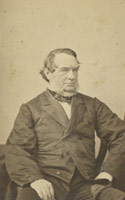![]()
Photograph of Samuel Joseph May, ca. 1850s.
![]()
Samuel J. May Anti-Slavery
Collection
![]()
Born in Boston, Massachusetts, Samuel J. May graduated from Harvard in
1817 and subsequently became a teacher. After studying theology under
Norton and Ware in Cambridge, he was ordained in 1822. He served as a
pastor in churches in Connecticut and Massachusetts, before coming to
Syracuse in 1845. His congregation, now named the May Memorial Unitarian
Universalist Society, still exists there.
May was first and foremost a humanitarian and he worked tirelessly for a variety of causes. As a pacifist, he organized the Windham County Peace Society. As an early champion of equal rights for women, he invited Angelina Grimké to address his congregation on abolitionism, and wrote a sermon “the Rights and Condition of Women” in 1846. As an abolitionist, he served as a general agent and secretary of the Massachusetts Anti-Slavery Society, and his house was a station on the Underground Railroad between Boston, Syracuse and Canada.
May’s friendship with Cornell’s first President, Andrew Dickson White, and his passionate belief in the enduring educational value of his abolitionist library inspired May to donate his collection to Cornell University in 1870, a year before his death.
![]()
- Anti-Slavery Collections at Cornell
- Samuel J. May Anti-Slavery Collection
- May Collection Designated a National Treasure
| |
| |
| |
| |
| |
| |
| |
| |
| |
| |
| |
| |

Copyright © 2002 Division
of Rare & Manuscript Collections
2B Carl A. Kroch Library, Cornell University, Ithaca, NY, 14853
Phone Number: (607) 255-3530. Fax Number: (607) 255-9524
For reference questions, send mail to:
rareref@cornell.edu
For questions or comments about the site, send mail to: webmaster.
